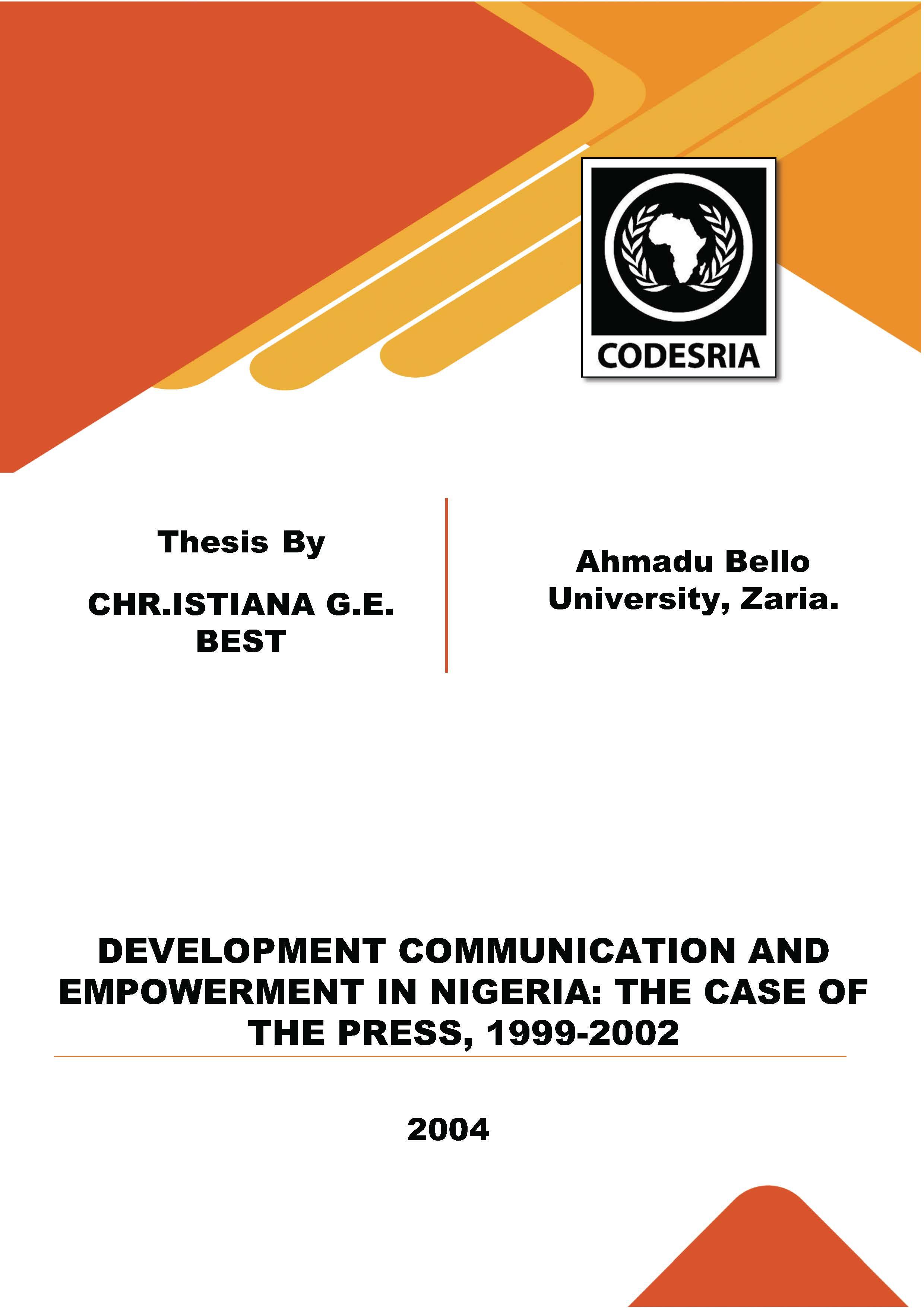Development communication and Empowerment in Nigeria: the case of the Press 1999-2002
Mots-clés :
Presse, communication développement, médias de masse, NigeriaSynopsis
Cette étude a examiné comment la presse a engendré une véritable participation et renforcé l'autonomisation au Nigéria entre 1999 et 2002. Pour atteindre cet objectif, une enquête, à l'aide de questionnaires, a été menée dans six villes nigérianes, représentant les six régions géopolitiques du Nigéria et Abuja, la capitale fédérale. . Six cents (600) questionnaires ont été distribués et les sujets ont été tirés au sort selon une répartition de 100 dans chaque ville. L'analyse des données a été effectuée sur ordinateur à l'aide du logiciel SPSS (Statistical Package for the Social Sciences). Nos conclusions démontrent que les systèmes de presse existants au Nigeria ne répondent pas aux besoins de développement de la totalité des Nigérians - mais servent unélite urbaine insignifiante mais puissante, tout en reléguant la majorité des Nigérians. Il ressort également de cette étude que cet échec de la presse est principalement dû aux structures antidémocratiques des institutions médiatiques qui fonctionnent dans un sens vertical et autoritaire, avec la concentration du pouvoir, des ressources et des services des médias dans les centres urbains. Ces médias transmettent donc les valeurs et l'idéologie de l'élite dirigeante. Ainsi, l'étude conclut que la presse nigériane, dans sa structure, son orientation, son contenu, sa langue et son flux d'informations actuels, ne s'adresse qu'à un nombre limité de Nigérians urbains et, par conséquent, ne promeut pas la participation et l'autonomisation tant recherchées à des fins de développement.Par conséquent, l'étude recommande la démocratisation du système de communication nigérian en augmentant la participation qui renforcera l'autonomisation et le développement à la base. Ces moyens de communication, notamment la radio et la presse vernaculaire, doivent être implantés au sein de la population rurale. Cela donnera à la majorité des Nigérians un accès non seulement aux messages produits par d'autres, mais aussi aux moyens de produire et de diffuser leurs propres messages - favorisant ainsi la participation et l'autonomisation.
Téléchargements
Références
Adamu, H. (1976) "Power of the Press" in Daily Times of Nigeria: The Story of the Daily Times 1926-1976, Lagos..
African Encyclopaedia (1974) London: Oxford University Press.
Ahluwalia, Montek S., (1976) "Inequality, Poverty and Development", Journal of Development Economics, Vol. 3, No. 4, December 1976, pp. 307- 42.
Ainslie, Rosalynde (1967) The Press in Africa, Communications Past and Present, New York: Walker and Co.
Akande, Olatunde (1984) "Influence of Publisher's Political Orienta ion on the overage of National Issues", unpublished M.Sc. Research Thesis, Lagos: University of Lagos.
Almond, G. A and Powell, Jr. G. B. (1986) Comparative Politics: A Developmental Approach, Boston: Little Brown and Co.
Almond, G. A (1958) "A Comparative Study of Interest Groups and the Political Process", American Political Science Review,1.111, pp. 270- 282.
Almond, G. A. (Ed.) (1970) The Politics of the Developing Areas, New Jersey and Princeton: University Press.
Althusser, L. (971) Lenin, Philosophy and Other Essays (Tr. by Ben Brewster) New York and London: Monthly Review Press.
Altschull, J. S. (1984) Agents of Power: The Role of the News Media in Human Affairs, New York: Longman.
Alvares, Claude (1993) Science, Development and Violence, New Delhi: Oxford University Press.
Amin, Samir (1990) Ma/development Anatomy of a Global Failure, London: Zed Books.
Amin, Samir (1977) Imperialism and Unequal Deveiopment, New York.
Amin, Samir (1964) Neocolonialism in West Africa, Hamondsworth: Penguin.
Apfell-Marglin, F. (1990) Development and Repression: A Feminist Critique WIDER Research Project.
Aristotle (1958) Politics, trans. Ernest Barker, New York: Oxford University Press. ·
Ayedun-Aluma, V. S. (1996) "The Role of the Press in Promoting Democracy". In I. Ibrahim and T. Akan.ni (Eds.) Nigeria: The Mass Media and Democracy, Lagos: Civil Liberties Organisation.
Ayee, J. R. A. (1990) "Democratisation, Good Governance and Administrative Reform: Are They Bedfellows?" In Bonne Governance Development en Afrique (IAD).
Azikiwe, N. (1937) Renascent Africa, London: Frank Cass and Co. Ltd. Babangida, I. B. "The Justification for Change of Government" in Portrait of a New Nigeria - Selected Speeches of IBB, Precision Press (Place and date of publication not indicated).
Baker, George W. et al (1962) Man and Society in Disaster, New York: Basic Books, Inc.
Sarkin, David, (1994) "The Spectre of Rural Development", NACLA Report on the Americas, Vol. 28, No. 1, July/August.
Bayart, Jean-Francois (1966). The State in Africa: The Politics of the Belly, Harlow: Longman.
Bendix, A. (1967) "Tradition and Modernity Reconsidered" Comparative Studies in Society and History, Vol. 9.
Bent, Silas (1939). Newspaper Crusaders: A Neglected Story, New York: McGraw-Hill.
Best, C. E. (1996). Press Development in Nigeria: A Comparative Analysis, Jos: Midland Press Ltd.
Berelson, Bernard ((1952). Content Analysis in Communication. Research, Glencoe: The Free Press.
Blarberg, I. V. et al (Eds.) (1977). Systemic Theory: Philosophical and Methodological Problems, Moscow: Progress Publishers.
Bloomstrom, Magnus and Bjorn Hethene (1984) Development Theory in Transition, London: Zed Books.






